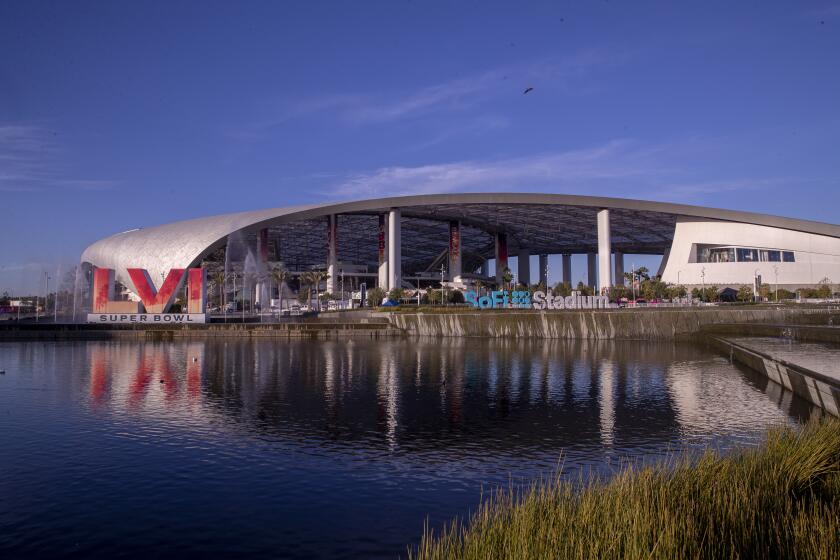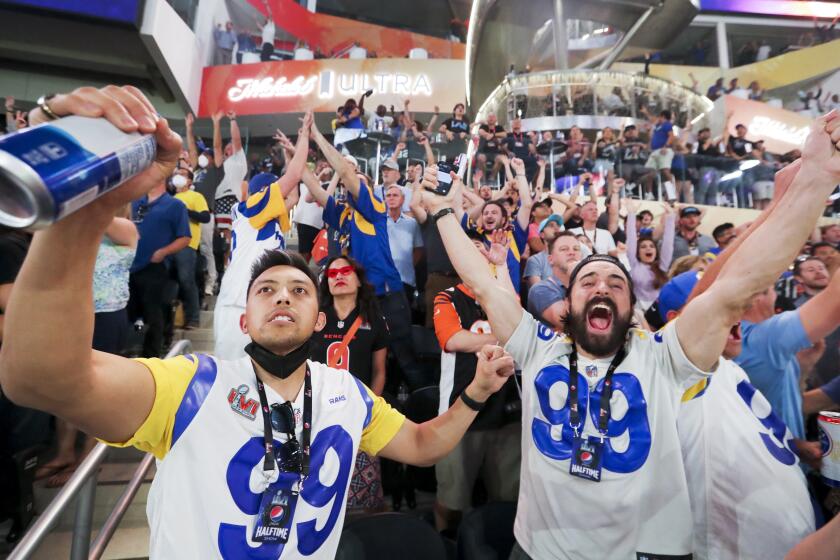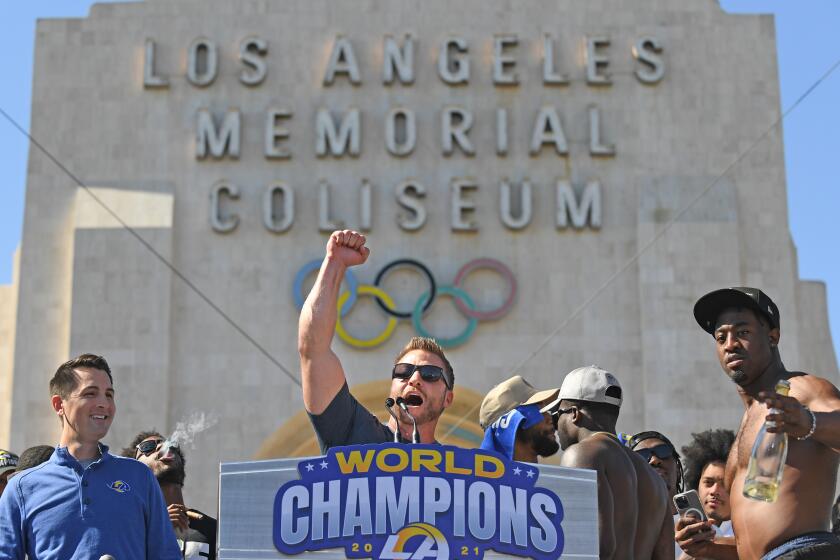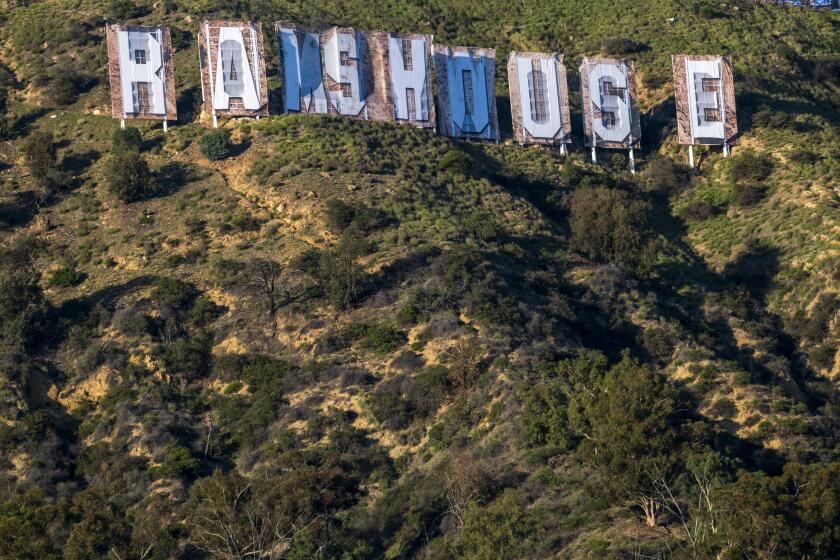At the ultimate Super Bowl party, nearly 2,000 pounds of food are saved from the dumpster
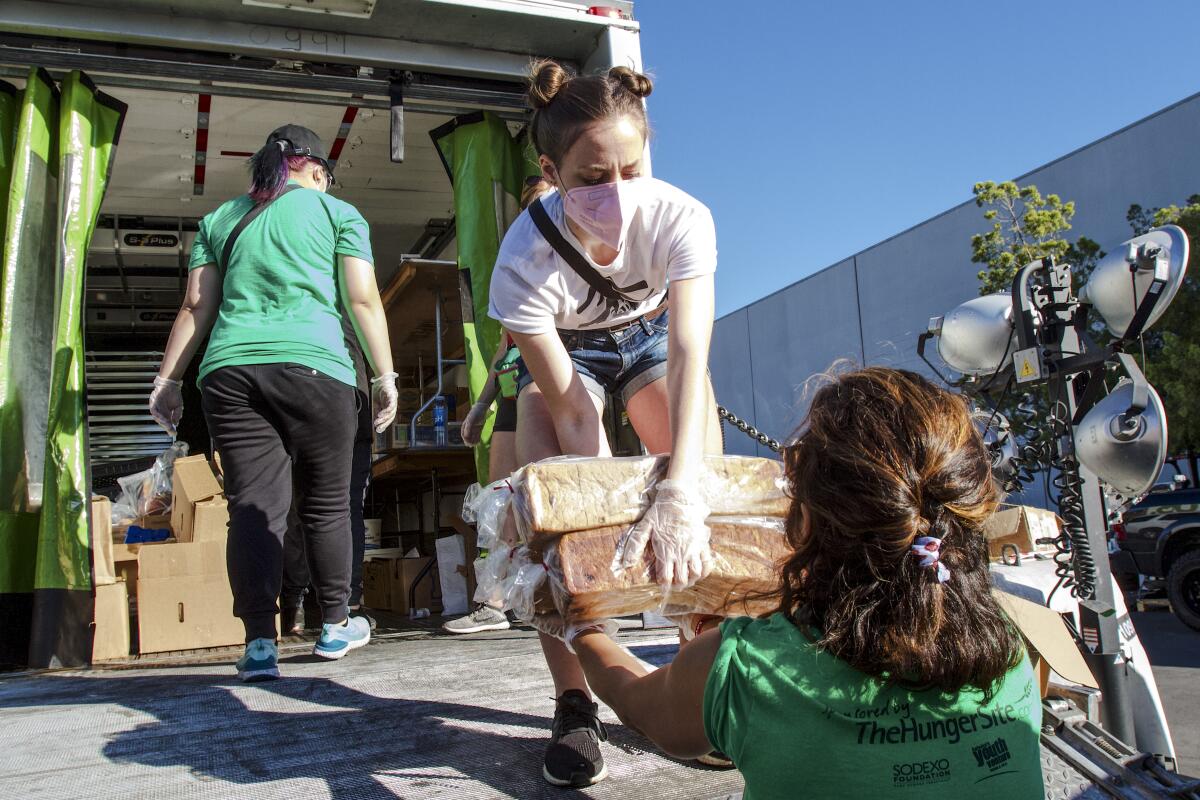
- Share via
Just outside SoFi Stadium on Super Bowl Sunday, 2,500-plus guests strolled past row upon row of food stalls with freshly grilled octopus, cheese-oozing burgers, fried chicken, caviar-topped steak and carts brimming with mochi ice cream, while women wearing utility belts adorned with pails of oysters, hot sauce and mignonette wandered through the crowd, shucking and serving.
It was the annual Players Tailgate event, a pregame party from chefs Guy Fieri and Aaron May, who were mingling with celebrities and fellow chefs and keeping the festivities lively until kickoff. As with many such events, the spread offered an abundance of refreshments and a virtual guarantee that some of them wouldn’t be consumed. Hundreds of pounds of food could have gone to waste that day — but a Washington, D.C.-based nonprofit dedicated to fighting food insecurity was there to ensure that didn’t happen.
For the record:
12:20 p.m. Feb. 16, 2022A previous version of this story listed one of the recipient organizations as the Greater West Hollywood Food Coalition; that organization is now known as the Hollywood Food Coalition.
The Food Recovery Network team landed two days before the event, but the planning began weeks ago. Typically the nonprofit encourages its national system of student volunteers to source and donate excess food from their universities’ dining halls. For an event of this scope, however, with so much leftover food anticipated, FRN would need to coordinate dropoffs at multiple L.A.-area organizations near the Hollywood Park Casino, where the Players Tailgate would take place. After all, the FDA states that prepared food should no longer be consumed after it has been left unrefrigerated for two hours, and the clock was ticking on an 82-degree afternoon on the day of one of the biggest sporting events of the year.
The goal is simple but the coordination is complex. The organization, which currently has 17 student chapters in California, has to recover excess prepared-but-unserved foods (as well as raw ingredients), tailor the surplus culinary donations to a food bank or other organization’s requirements and hours of operation, and then make the trip within the allotted window for food safety, monitoring the surplus-food tally and dwindling availability as the event plays out. The nonprofit, funded through contributions and sponsorships from organizations such as the Annenberg Foundation and the National Association of Realtors, won’t recover food in dented cans or opened packaging, or prepared foods that have been sitting out beyond two hours or plated to be served to guests. The ideal is shelf-stable or raw (and refrigerated) or unopened materials, or catering trays of fully cooked foods.
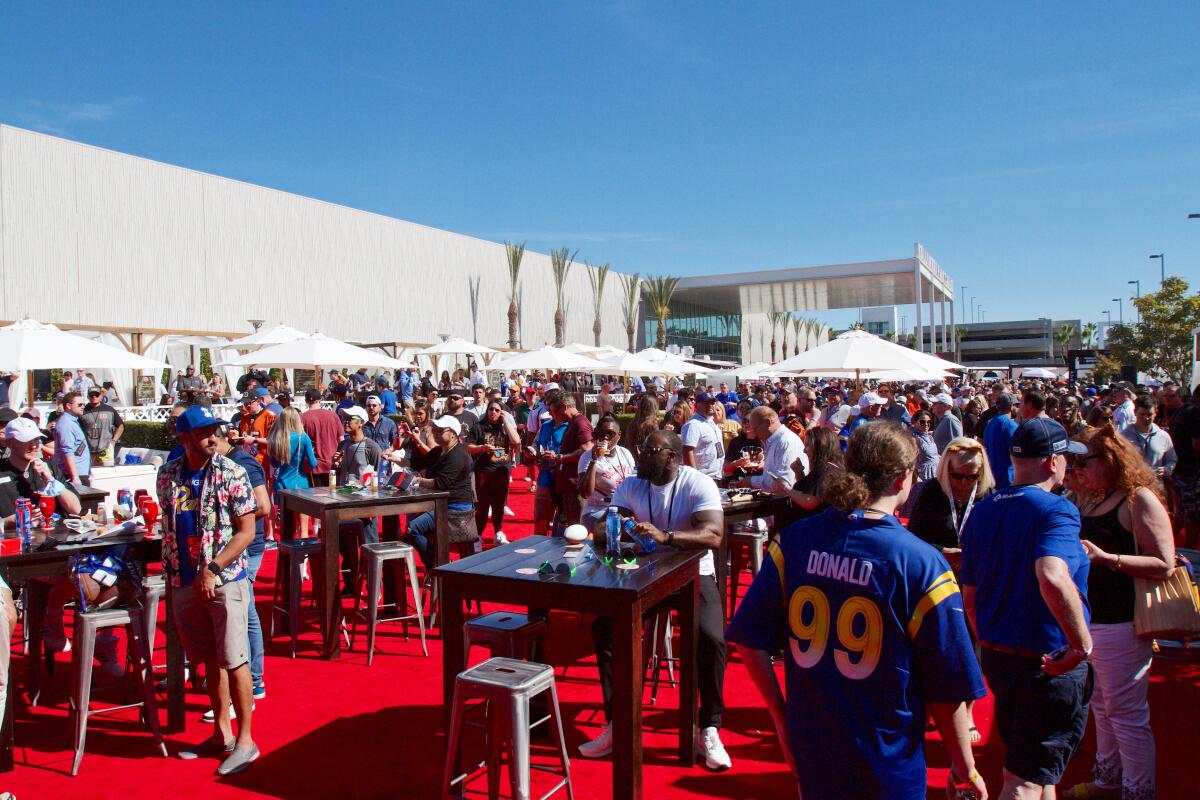
“These are nonprofits that deserve to serve food with dignity, and everybody deserves to eat quality food, so we never want to serve something that’s questionable,” said Erin Price, program manager for the Food Recovery Network, and its sole representative on-site to transport 5,000 pounds of food left over from 2020’s Players Tailgate party before Super Bowl LIV in Miami.
That’s when Price learned just how demanding the job can be, and just how difficult it is to negotiate the logistics surrounding parking and ground transportation during the Super Bowl. She was unable to meet up with representatives from the recipient organization, so she had to return to the airport to rent a van, then load and unload it multiple times over two days and drive 5,000 pounds of food to the organization — by herself. This year she brought more resources: two colleagues, five volunteers and two rental vans.
“Being able to be flexible and problem solve in the moment is really critical,” Price said. “Food-safety issues are one thing we don’t ever want to happen, so if it was a question about the integrity of the food at any point we would just have to say, ‘We don’t think we can get this donation to you safely and we tried our best.’ Sometimes that’s the hard part about it: It doesn’t work out. But so far we’ve been pretty successful.”
A recent study from the Los Angeles County Emergency Food Security Branch and the USC Dornsife Public Exchange found that, as of the first half of 2021, one in 10 L.A. County households struggles to maintain consistent access or means to purchase fresh food. Despite housing some of the country’s most affluent communities, L.A. County also is host to rampant poverty and homelessness. At the Players Tailgate, the goal was to split more than 1,000 pounds of food between two of L.A.’s many organizations that exist to feed the food-insecure and offer other forms of support.
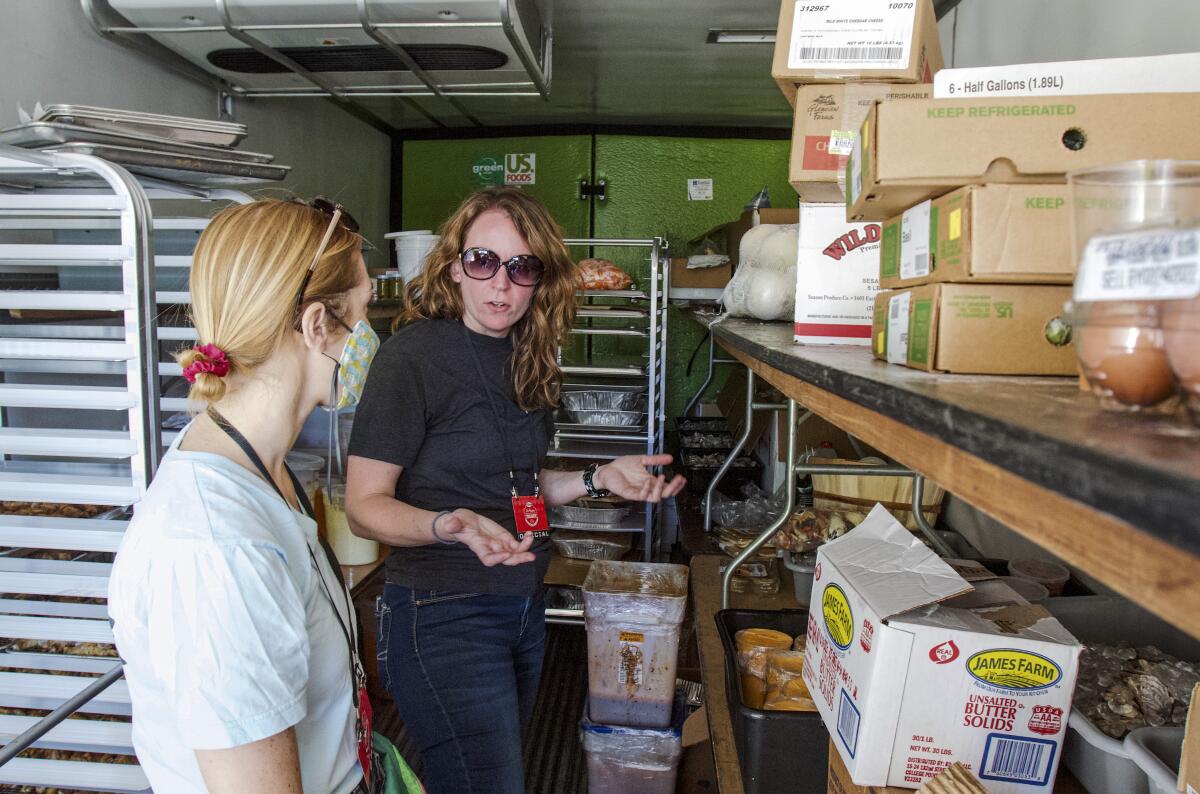
Throughout an afternoon peppered with pro football players being interviewed on a stage, Fieri tossing (unlit) cigars to the crowd, and even a surprise appearance from Nickelback’s Chad Kroeger, Price — along with FRN executive director Regina Anderson and stakeholder engagement manager Cassie Olovsson — worked to continually calculate and recalibrate the best method to deliver boxes of unopened ingredients. They were destined for the Westside Food Bank, which serves organizations that feed Inglewood, Santa Monica, Venice and Culver City, among other neighborhoods. Additional unopened ingredients and prepared foods went to the Hollywood Food Coalition, whose nightly “community dinner” series could serve the event’s hot foods — a rarity.
For chef and pitmaster Stan Hays, who oversaw the Tailgate’s BBQ corridor, the service the Food Recovery Network provides is ideal: Because they fear running out of food before guests are sated, participating chefs tend to overbuy product. Sadly, he says, this regularly leads to countless trays and bins of food being thrown out at the end of the day.
Hays co-founded and serves as the CEO of Missouri-based Operation BBQ Relief, which regularly works to feed people in an alternate way: When natural disasters strike or events such as the pandemic suddenly thrust communities into hunger, Hays and his team serve smoked meats to first responders and those in need. Feeding community is always at the front of his mind and, thankfully, he says, he’s seen an attention to curbing food waste grow in the last four to five years.
“I think food insecurity has helped drive that,” he said. “I think as more people started looking at it, it drove the awareness and consciousness of the need. In better days it was just out of sight, out of mind, unfortunately.”
Fieri, the face of the annual Players Tailgate, is a noted proponent of redistributing unused, unexpired items; surplus items purchased for shows such as “Guy’s Grocery Games” are donated to local food banks. Aaron May, who curates the culinary lineups, works with local nonprofits to donate food from a series of these tailgate events, which run throughout the season and culminate in the Super Bowl party.
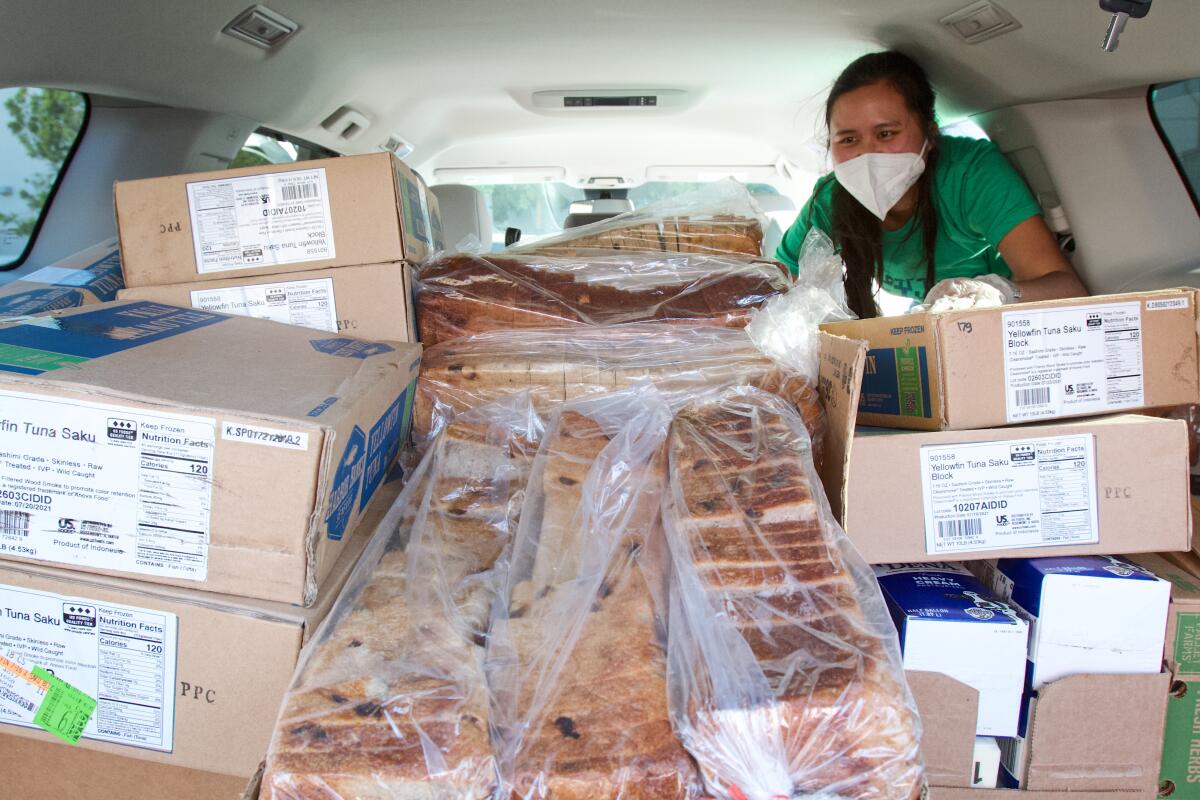
As guests began to shuffle out of the Players Tailgate, toward the stadium or various viewing parties Sunday afternoon, one of FRN’s white rental vans backed into a makeshift spot next to the refrigerated truck keeping the crab legs, caviar, gallons of milk, produce and towering boxes of yellowfin cool throughout the day, along with anything else that went unused by the chefs.
The volunteers and FRN staffers quickly formed an assembly line, handing boxes from one person to the next and loading them into the back of the van headed for the Westside Food Bank’s Santa Monica warehouse. A second van was filled with unopened goods and prepared foods bound for the Hollywood Food Coalition.
Nicole Yoo, a senior at Chapman University and a member of its newly formed Food Recovery Network chapter, said her mother’s interest in composting had given her an awareness of food waste, but since helping to form the new chapter and coordinating excess-food pickups from a farmers market near the campus, it’s become a cause dear to her own heart. It’s why she was there with two of her fellow Chapman students — that, and it was the Super Bowl.
“We mostly do farmers market recoveries, so we’re used to lifting heavy things, but we wanted to do this one because it’s an amazing opportunity,” Yoo said before hoisting a few boxes into the van herself. “When else are we going to get to do something like this?”
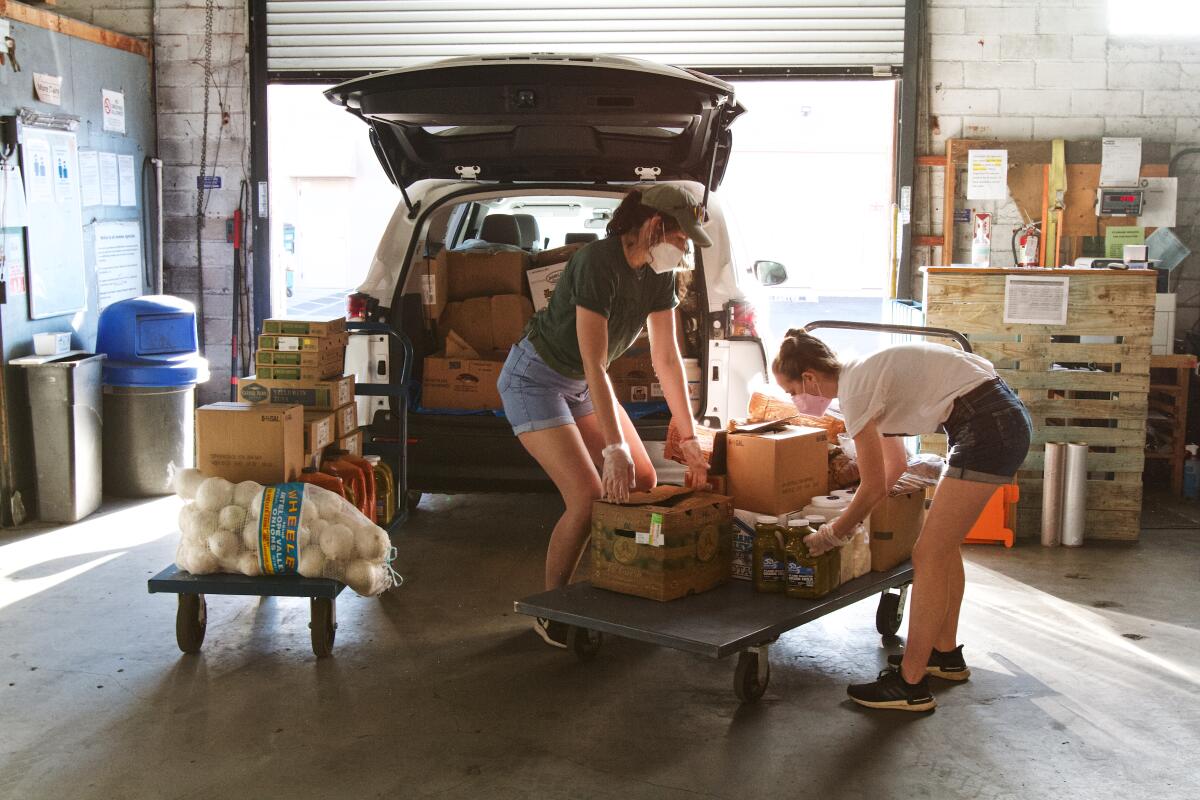
More to Read
Eat your way across L.A.
Get our weekly Tasting Notes newsletter for reviews, news and more.
You may occasionally receive promotional content from the Los Angeles Times.




